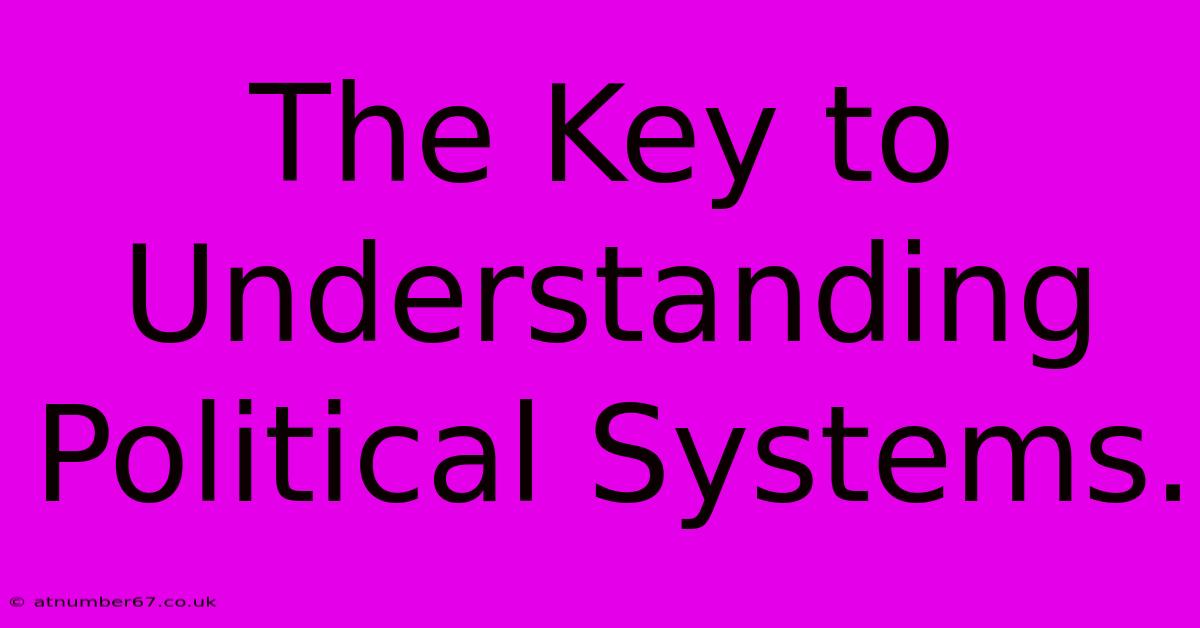The Key To Understanding Political Systems.

Table of Contents
The Key to Understanding Political Systems
Understanding political systems can feel like navigating a dense jungle. From democracies to dictatorships, monarchies to republics, the sheer variety can be overwhelming. But fear not! This guide will equip you with the key concepts to unlock the complexities of political structures worldwide. We'll explore the core components, analyze different models, and highlight the factors that shape their evolution.
What Makes Up a Political System?
At its heart, a political system is a framework for exercising power and making decisions within a society. Several key elements intertwine to form this framework:
1. Governance Structures:
This encompasses the institutions responsible for governing – think legislatures (like parliaments or congresses), executives (presidents, prime ministers, and their cabinets), and judiciaries (courts and legal systems). The relationship between these branches is crucial. A system with strong checks and balances, like the US, differs dramatically from a highly centralized system where power is concentrated in the executive.
2. Political Ideologies:
Underlying every political system are the beliefs and values that shape its policies and practices. These ideologies, ranging from liberalism and conservatism to socialism and anarchism, provide the philosophical underpinnings for how a society should be governed. Understanding the dominant ideologies within a system is vital to grasping its priorities and actions.
3. Citizen Participation:
The degree to which citizens can participate in the political process significantly impacts the system's nature. Democracies emphasize broad citizen participation through voting, protests, and lobbying. Authoritarian regimes, conversely, restrict participation and often suppress dissent. The level of citizen engagement, and the mechanisms for participation, are key indicators of a system’s character.
4. Rule of Law:
A well-functioning political system requires a robust rule of law – a system where everyone, including the government, is subject to and accountable under the law. This includes fair trials, independent judiciaries, and the protection of fundamental rights and freedoms. The strength and impartiality of the rule of law are critical benchmarks for evaluating a political system's legitimacy and effectiveness.
Types of Political Systems: A Quick Overview
While countless variations exist, several broad categories of political systems help organize the landscape:
1. Democracies:
Characterized by free and fair elections, protection of civil liberties, and the rule of law. Examples include the United States, Canada, and many European nations. Even within democracies, there's significant variation: presidential systems (like the US) differ from parliamentary systems (like the UK).
2. Authoritarian Regimes:
These systems concentrate power in the hands of a single person or a small elite group, often suppressing opposition and limiting individual freedoms. Dictatorships, totalitarian states, and theocracies fall under this umbrella. Examples include North Korea, China (a one-party state), and some Middle Eastern monarchies.
3. Monarchies:
Power is inherited through a family line, with a king or queen as the head of state. Constitutional monarchies, like the UK, combine a monarch with a democratically elected government. Absolute monarchies, on the other hand, vest ultimate authority in the monarch.
Factors Shaping Political Systems
Political systems are not static; they evolve over time, influenced by several interconnected factors:
- Historical Context: A nation's history significantly shapes its political institutions and culture.
- Economic Development: Economic factors, such as wealth distribution and levels of industrialization, influence political structures and policies.
- Social Factors: Factors such as ethnicity, religion, and social class can profoundly affect political dynamics.
- International Relations: Global events and interactions with other nations can influence a country's internal political development.
Conclusion: Beyond the Labels
Understanding political systems goes beyond simply labeling them as "democracy" or "dictatorship." A deeper understanding requires analyzing the intricate interplay of institutions, ideologies, citizen participation, and the rule of law. By considering these elements, we can gain a more nuanced and comprehensive understanding of the complex world of politics. This framework provides a starting point for critically evaluating and comparing political systems around the globe, fostering informed citizenship and a more engaged understanding of the world around us.

Thank you for visiting our website wich cover about The Key To Understanding Political Systems.. We hope the information provided has been useful to you. Feel free to contact us if you have any questions or need further assistance. See you next time and dont miss to bookmark.
Featured Posts
-
Kai Watts The Teen Star We Didnt See Coming
Apr 15, 2025
-
Madhavans Son His Fight For Justice
Apr 15, 2025
-
Branko Babics Net Worth Surprisingly Low
Apr 15, 2025
-
Lattos Moms Secret To Success
Apr 15, 2025
-
Pointless To Riches Alexander Armstrongs Wealth Journey
Apr 15, 2025
